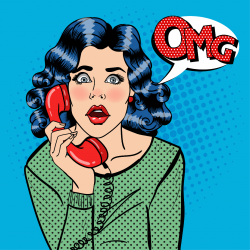Natural English Resources
Videos & Analysis, Sample Materials, Tips & Techniques, and More!
quotes on Colloquial English
'The chief use of slang is to show that you're one of the gang.'
David Crystal (Linguist, Author)
Meaning: Every social group bonds through its own unique language. Teens and young people have their own slang as do lawyers, doctors, and other professional and social groups.
Colloquial English in Context
Informal expressions are ubiquitous (commonplace) at home, at school, at work and on the street. Examine the following sample materials to identify how colloquial English appears in a variety of contexts.
Everyday communication
Popular Media
English speakers use slang, idioms and other colloquial expressions in daily spoken / written interactions.
Informal words and expressions are also commonplace in all forms of popular media (i.e. digital and print media such as newspapers, magazines, journals, cartoons, blogs, etc.)
Conversations
Proverbs
Always put your best foot forward.
Don’t bite off more than you can chew.
There is no time like the present.
No pain, no gain.
Cartoons
Articles
How Idioms, Slang & Cliches impact Communication
OMG: IM Slang is Invading Everyday English
"Instant message expressions...extend the range of the language, the expressiveness of the language [and] the richness of the language."
David Crystal (Linguist, Author)
Tips & Techniques
When you are a passenger in a car or riding the subway or train, you will see dozens of billboards and advertisements (ads). Instead of surfing social media or vegging out, notice the language that is all around you and even write down some new and/or interesting words and phrases you read. Reading billboards and ads can also help to reinforce and contextualize new words and phrases that you have recently learned!
You will read lots of slang and colloquial language usage on social media and in text and instant messaging. Make note of any words and phrases that are commonly used and new to you. You can also check out the audio/article to the left, “How Idioms, Slang & Cliches Impact Communication” to learn more about this! Finally, remember to only very casual language for casual spoken interactions.
Reading fiction on blogs, in novels, and in articles is a great way to build a more colourful vocabulary with lots of natural expressions. You will likely discover some great new language to add to your vocabulary and reinforce the usage of some language that you have recently learned!

For your EDUtainment
Fun Stuff that You can also Learn from
These humorous video clips show that it is important to understand colloquial language; they also highlight the fact that misuse or overuse of slang, idioms and cliches can lead to communication breakdowns.
Awkward Conversation
Big Bang Theory: In this clip, Sheldon attempts to make small talk, but he comes off sounding strange and making Penny uncomfortable. Find out why below:
Misunderstandings
Arriving in a new country can be scary. In his standup comedy routine, comedian Nazareth shares some of the ways slang can be misinterpreted by newcomers. Fill out the Bingo Card below with your guesses – then check the answers provided!
Idioms and Cliches
A father use a lot of idioms and cliches to give relationship advice to his daughter. Read the transcript below. The idioms and cliches used are highlighted in blue:
